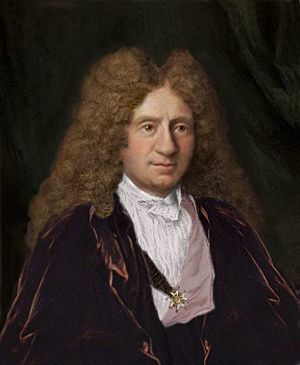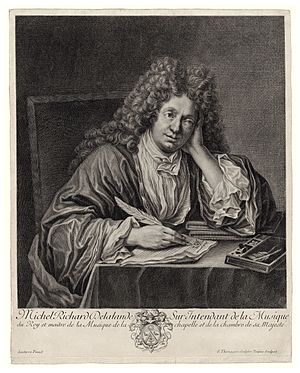Michel Richard Delalande facts for kids
Michel Richard Delalande (born December 15, 1657 – died June 18, 1726) was a famous French Baroque composer and organist. He worked for King Louis XIV of France. Delalande was one of the most important composers of a type of church music called grands motets. He also wrote orchestral music, like his Simphonies pour les Soupers du Roy (Symphonies for the King's Suppers), and music for ballets.
Contents
Who Was Michel Richard Delalande?
Delalande was born in Paris, France. He lived at the same time as other famous composers like Jean-Baptiste Lully and François Couperin. Delalande taught music to the daughters of Louis XIV. He also became the director of the French royal chapel in 1714. He held this important job until he passed away in 1726 in Versailles.
Delalande's Music for the King
Delalande was known as the best composer of French grands motets. These were grand and impressive pieces of church music. They were written for solo singers, a choir, and a large orchestra. King Louis XIV especially liked this type of music.
The King once held a contest for composers. He gave them the same religious text and asked them to write music for it. The King himself was the judge! Delalande was one of four winners. Each winner was asked to compose sacred music for a different part of the year. Delalande's part of the year was the most important because it included the Christmas holiday. Later, he became fully responsible for all the church music for the entire year.
What Music Did Delalande Write?
Delalande created many different versions of his musical works. His early music followed the French Baroque style. But later, he added more Italian musical ideas. This included more melismas (singing many notes on one syllable) and more polyphony (where several independent melodies are played at the same time).
There are at least four different collections of his music. Each collection shows a slightly different view of his work. This depends on who put the collection together.
Vocal Music
- grands motets: These were long pieces of Latin church music, often based on psalms. A famous example is Delalande's Te Deum from 1684.
- petits motets: These were shorter Latin pieces. They were written for a few singers and instrumental soloists. Some were called élévations, which were sung during the communion part of a church service.
Instrumental Music
Even though Delalande was an excellent organist and harpsichord player, he did not leave behind any keyboard music.
- ritournelles: These were instrumental sections that often returned throughout a piece. Delalande wrote twelve important ritournelles for a book of Italian songs in 1695. For example, he wrote a 31-bar-long ritournelle for two violins and a continuo. This piece was played before an aria (a song for one voice) from an opera by Domenico Freschi.
Selected Recordings of Delalande's Music
- Symphonies pour les soupers du Roy (Symphonies for the King's Suppers), conducted by Hugo Reyne (1990).
- Les Folies de Cardenio (The Insanities of Cardenio), a court ballet, conducted by Christophe Coin (2004). This ballet was inspired by the story of Cardenio from Cervantes' famous book, Don Quixote.
- Various Grands Motets, including Te Deum, Confitebor, Super Flumina, conducted by William Christie (1991).
- Other Grands Motets, such as De Profundis, Miserere, and Confitebor tibi, conducted by Edward Higginbottom (1990).
- Grands Motets: Dies Irae and Miserere, conducted by Philippe Herreweghe (1991).
- Grands Motets: Beati quorum, Quam dilecta, Audite caeli, conducted by Olivier Schneebeli (2002).
- Grands Motets: Deus noster refugium (Psalm 46) and Exaltabo te Domine, conducted by Martin Gester (2001).
- Grands Motets: Regina coeli, De Profundis, Cantate Domino, conducted by Paul Skidmore (1995).
- Petits motets: Miserere à voix seule and Vanum est vobis, featuring singers like Françoise Gens and Sandrine Piau, conducted by William Christie (1992).
- 3 Leçons de Ténèbres 1730, conducted by Sophie Desrochers (1996).
See also
 In Spanish: Michel-Richard Delalande para niños
In Spanish: Michel-Richard Delalande para niños
 | Janet Taylor Pickett |
 | Synthia Saint James |
 | Howardena Pindell |
 | Faith Ringgold |



